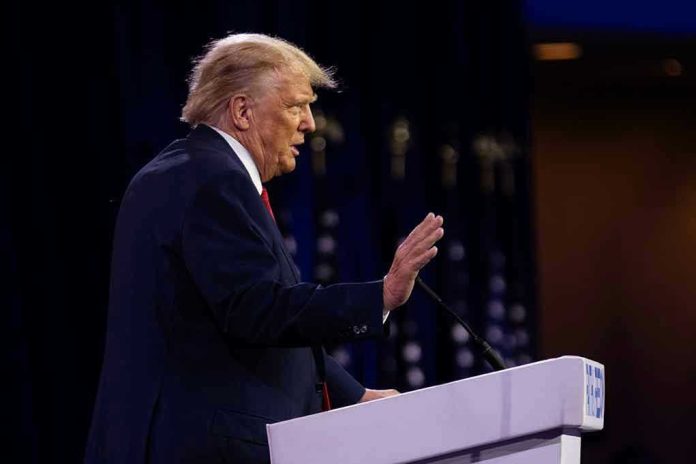
The Trump administration’s unprecedented $5 billion foreign aid rescission may have been branded as a strike against “woke” waste, but the real shock lies in who stands to benefit—and who is left exposed.
Story Snapshot
- First use of a “pocket rescission” in 50 years, canceling massive portions of U.S. foreign aid
- Administration claims to target “woke, weaponized, and wasteful spending,” but critics warn of harm to global health and democracy
- 86% of USAID awards canceled, with global health and development programs among the hardest hit
- Experts question whether wealthy elites, not the world’s poor, are the true beneficiaries of these cuts
Trump’s Foreign Aid Rescission: A Shock to the System
August 2025 marked a seismic moment in foreign policy: President Trump deployed a “pocket rescission,” canceling $5 billion in congressionally approved foreign aid and international organization funding. This move, justified as a blow against “woke, weaponized, and wasteful spending,” instantly upended decades of bipartisan consensus about America’s global responsibilities. The administration’s rhetoric focused on cutting climate change, DEI, and LGBTQ initiatives—and the shockwaves rippled from Washington to the world’s most vulnerable communities.
Behind the headlines, the rescission’s scope dwarfed previous attempts to trim foreign aid. Key programs in global health, democracy promotion, and humanitarian relief were thrown into limbo. The White House insisted the cuts would restore fiscal discipline and American priorities, but critics warned that the casualties would be felt most by those with the least power to fight back.
Winners, Losers, and the Billionaire Paradox
Reports emerged in early 2025 that 86% of USAID awards had been canceled, a staggering blow to the backbone of U.S. development and health work abroad. The administration submitted its first rescission package to Congress in June, including $400 million in global health cuts, and signaled that no sector tied to so-called “leftist” values was safe. The White House maintained that American taxpayers should not underwrite programs that do not serve core national interests.
Yet critics, including the Center for American Progress, pointed to a deeper irony: the cuts may ultimately serve the interests of wealthy elites at the expense of the world’s poor. Allegations swirled that “needy billionaires”—investors and influential stakeholders—would benefit from redirected or unspent funds, while support for HIV/AIDS, malaria, and maternal health programs evaporated. The evidence for this claim remains murky, but the perception of a policy designed to help the powerful has fueled outrage in advocacy circles.
The Ripple Effect: Global Health and American Interests at Risk
The Kaiser Family Foundation and other experts have sounded the alarm about the long-term consequences. Global health infrastructure, painstakingly built over decades, faces immediate disruption. Programs like PEPFAR, which once symbolized American leadership in the fight against AIDS, now confront existential funding gaps. Humanitarian organizations warn of a chilling effect, as uncertainty rocks the sector and undermines trust in American commitments.
The economic, social, and political fallout is still unfolding. Developing nations reliant on U.S. support brace for sharp declines in health and education funding. Local economies tied to aid contracts feel the pinch. Politically, America’s soft power—a subtle but potent tool—erodes as allies question the reliability of U.S. partnership. Some experts argue these cuts risk ceding influence to rivals who are eager to step into the void left by American retreat.
America First or America Adrift?
The administration frames the rescission as an overdue correction, aligning foreign aid with conservative values and fiscal restraint. Critics counter that the damage to global health, development, and democracy is too great a price for short-term political points. This debate echoes through Congress, advocacy organizations, and international forums, with little sign of consensus.
The accusation that billionaires are the real winners remains unproven, yet the optics of slashing aid to the world’s poorest while protecting the interests of the wealthy have struck a nerve. For a generation raised on the promise of American leadership, the question looms: does this rescission signal a permanent shift, or will history judge it as a costly detour? The world is watching—and so are those who know that when America rewrites the rules, the consequences are rarely confined to the fine print.
Sources:
Kaiser Family Foundation: Foreign Aid Review
Kaiser Family Foundation: PEPFAR Status
Center for American Progress Fact Sheet



